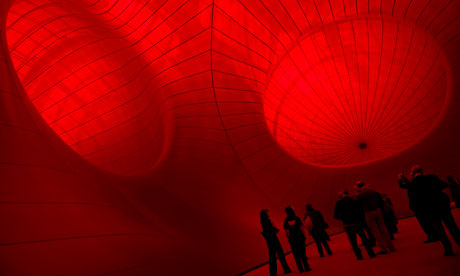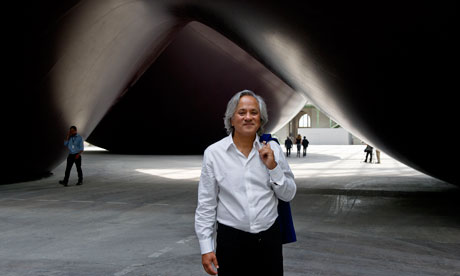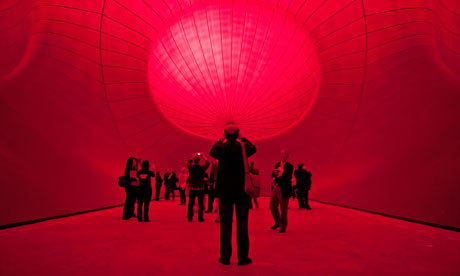27.6.11
23.6.11
Anish Kapoor dedicates Leviathan sculpture to Ai Weiwei
Call goes out for museums and galleries to close for a day in sympathy for missing Chinese artist
guardian.co.uk,



Anish Kapoor cancels exhibition at National Museum of China
Yesterday, Anish Kapoor cancelled plans to exhibit new sculptures at the National Museum of China in Beijing as a form of protest against the recent detainment of artist and activist Ai Weiwei. The exhibition was to be a part of the “UK Now” festival, what British Council chief executive Martin Davidson says aims to “build supportive links between people in the UK and China”.
Kapoor has previously protested Ai’s detention, most recently during the vernissage for his sculpture Leviathan, currently on display at the Grand Palais in Paris. The piece was created for “Monumenta 2011”, an annual event issued by the French Ministry of Culture and Communication. Kapoor dedicated Leviathan – a bulbous structure within which there are rooms flooded with red light – to Ai Weiwei as a gesture of solidarity and protest.
Kapoor had been very vocal in his support of Ai Weiwei. Back in May Kapoor called for the worldwide closure of museums and galleries for a day in support of Ai Weiwei, saying “In a very simple way he is recording human existence…he’s a colleague, and artist”.
http://www.aiweiweifilm.org/en/anish-kapoor-cancels-exhibition-national-museum-china/
Why Ai Weiwei Was Let Go
Russell Leigh Moses is a Beijing-based analyst and professor who writes on Chinese politics. He is writing a book on the changing role of power in the Chinese political system.
The release of Ai Weiwei after 11 weeks of detention is clearly good news for those urging his freedom, even if the condition of his release is to stay quiet. But the sudden reappearance of the artist raises as many questions as it answers, chief among them: Why?
The easy answer is that Ai was released because the Chinese government succumbed to international pressure and global outrage.
But the real explanation lies elsewhere, in Chinese domestic politics. Ai’s incarceration was a direct expression of the battle being waged in Beijing over who gets to rule the country in the coming years.
The narrative in much of the West is that Ai Weiwei was detained because he was a critic of the Chinese government. International human rights organizations insist that this was one of those cases where the international community successfully stood up to Beijing, and that Ai’s freedom was due in direct measure to the force of global opinion. They point to museums and exhibitors who signed letters and staged exhibitions, and the continued complaints by officials interacting with their Chinese counterparts and raising Ai’s case as an irritant in relations with Beijing.
But while Ai found some measure of freedom, a number of his associates remain in custody or under surveillance. Nor was there any amnesty announced for other detainees currently under investigation. Silence about those cases should be no surprise, for Beijing has shown itself to be unconcerned about polishing its international image. Where international pressure is concerned—be it for revaluation of the yuan or efforts to ease tensions in the South China Sea—Chinese officials far prefer looking tough to acting tentatively.
Ai might have a high profile in some parts, but he is a minor casualty on the larger battleground of Chinese politics. That war continues, with no clear victor in sight. Will it be the Right wing of the Communist Party, with their ideas of political reform and legal protections for citizens who wish to assist the government by being part of the loyal opposition? Will it be the Leftists, who favor a retreat to socialist values, even if takes mass movements and nostalgia to arrive there? Or will it be the current leadership in the Middle, which thinks that the society has to be supervised and–largely unafraid of what the world thinks–often happiest when foreigners complain?
Ai likely lost his freedom because he forgot that all the social media in China and the world could not protect him from being knocked about. And he probably got it back because the hardliners that fight a hundred battles every day to secure stability impressed upon him that very fact.
Beijing Releases Detained Artist
Ai Weiwei 'Confessed,' Will Pay Back Taxes, Official News Agency Says; a Yearlong Ban on Tweets, Speaking to Media
China's state-run Xinhua news agency said Mr. Ai was released Wednesday night because he "confessed" his alleged crimes, agreed to pay back taxes he was accused of evading, and was suffering from a "chronic disease."
Mr. Ai said his health was fine and thanked reporters for their support as he returned to his studio late Wednesday with his mother and his wife, according to witnesses. He added that he wasn't able to say more under the conditions of his bail.
"I can't say much. I can say I'm out. I'm on bail. But I can't say anything more under the conditions of my release," he told The Wall Street Journal by telephone.
Asked how long the media ban was in place, Mr. Ai said: "One year, at least."
Mr. Ai's unexpected release appeared to be designed to curtail widespread international criticism, but left many questions unanswered about his 11 weeks in extrajudicial detention and his future as an artist and activist.
His release came two days before Chinese Premier Wen Jiabao is due to begin a trip to Europe that includes Britain and Germany, two countries whose governments and artistic communities had been particularly outspoken in calling for Mr. Ai's immediate release.
The move was greeted with cautious optimism.
A spokesman for German Chancellor Angela Merkel said she welcomed the release, but he said that it is only a first step and that the accusations against Mr. Ai have to be resolved in a transparent fashion by the judicial system.
Mark Toner, a U.S. State Department deputy spokesman, said, "It's always a good thing when an individual who is only in prison for exercising [his] internationally recognized human rights is released."
"But there's obviously more individuals who are being held who we want to see emerge," Mr. Toner added.
The media ban on Mr. Ai suggests that China's increasingly powerful security apparatus is determined to silence prominent critics of the Communist Party, especially online, to ensure stability in the run-up to its 90th anniversary on July 1, and to a once-a-decade leadership change next year.
He was the highest-profile of several dozen dissidents—including many of China's leading human-rights lawyers—who have been extrajudicially detained since appeals for a "Jasmine revolution" in China began circulating online in mid-February.
Mr. Ai, 54 years old, had been thought for a long time to be immune from such treatment because his late father, Ai Qing, was one of Communist China's most famous poets, whose works have often been quoted by Chinese leaders, including Premier Wen.
Mr. Ai's family members say Chinese authorities never officially informed them that he had been detained and never detailed the charges against him, in what many legal experts describe as a deliberate violation of judicial procedure designed to intimidate other government critics.
Lu Qing, his wife, was allowed a 15-minute meeting with her husband at an undisclosed location near Beijing last month. After the meeting, she said he appeared to be well-cared-for and wasn't being held in an official prison.
State media and some Chinese officials have repeatedly denied that Mr. Ai's case is political. They say he was being investigated for economic crimes that included evading taxes through a company that handled his work, and for illegally destroying documents.
Xinhua said on Wednesday that Mr. Ai "has been released on bail because of his good attitude in confessing his crimes as well as a chronic disease he suffers from." It didn't elaborate on the illness.
Relatives say Mr. Ai suffers from high blood pressure and diabetes.
"The decision comes also in consideration of the fact that Ai has repeatedly said he is willing to pay the taxes evaded," the report quoted Beijing police as saying.
It also quoted the police as saying that Beijing Fake Cultural Development Ltd., a company Xinhua said Mr. Ai controlled, was found to have evaded a "huge amount of taxes" and to have intentionally destroyed accounting documents.
Mr. Ai's relatives have denied those charges, and have said that the company in question is registered in the name of his wife.
Several of Mr. Ai's work colleagues were also detained when he was taken into custody and over the next few days. There was no immediate word on their fate.
Write to Jeremy Page at jeremy.page@wsj.com
Dissident Chinese Artist Is Released

By EDWARD WONG
Published: June 22, 2011
22.6.11
De Chinese kunstenaar Ai Weiwei is vrijgelaten op borgtocht. Dat melden Chinese staatsmedia. Hij zou bekend hebben dat hij de belastingen ontdook en hij zou ook chronisch ziek zijn.
Ai was begin april opgepakt toen hij een vlucht naar Hongkong wilde nemen. Hij had kort daarvoor gezegd dat hij een andere plek wilde vinden om te werken. "Wat hier gebeurt, is erg ontmoedigend", zei hij. Enkele dagen later werd hij opgepakt en hij bracht meer dan twee maanden door in de gevangenis.
Ai Weiwei komt nu vrij onder voorwaarden. Volgens de staatsmedia heeft hij bekend dat hij de belastingen ontdook, maar komt hij vrij door zijn "goede gedrag". Hij zou ook chronisch ziek zijn.
Ai is een van de meest vooraanstaande Chinese kunstenaars. Hij werkte mee aan het olympisch stadion (het Vogelnest) in Peking. Hij spaart zijn kritiek op de Chinese overheid echter niet.
Eerder werd zijn studio in Sjanghai al gesloopt en mocht hij niet naar de prijsuitreiking voor de Chinese Nobelprijswinnaar Liu Xiaobo. In februari werd zijn eerste solotentoonstelling in zijn thuisland geannuleerd omdat de timing volgens de organisatoren "politiek te gevoelig" lag.
Chinese kunstenaar Ai Weiwei vrij op borgtocht - Buitenland - De Morgen
DM UPDATE De Chinese kunstenaar Ai Weiwei is op borgtocht vrijgelaten. Dat heeft zijn zus vandaag bevestigd naar aanleiding van een bericht van de de Chinese staatsmedia. Ai werd begin april opgepakt op verdenking van "economische misdrijven". Critici menen echter dat Peking de kritische kunstenaar de mond wil snoeren.
Volgens het staatspersbureau Xinhua is Ai vrijgelaten omdat hij een "goede houding" heeft getoond door te bekennen dat hij zich schuldig heeft gemaakt aan belastingontduiking. De 53-jarige kunstenaar zou ook lijden aan een niet nader genoemde chronische ziekte. Zijn zus zei evenwel dat zijn gezondheid "oké" is."Ik kan niet spreken"
Zelf sprak Ai kort met een journalist van het Duitse boulevardblad Bild. "Ik maak het goed. Ik ben weer thuis en ik ben vrij", zei hij. "Maar ik kan niet spreken." Mensenrechtenorganisaties spraken eerder de vrees uit dat Ai is vrijgelaten op voorwaarde dat hij zijn toon matigt.
Ai was onder meer kritisch over de censuur die China toepast op het internet. De Volksrepubliek heeft sinds begin dit jaar de vervolging van politieke dissidenten opgevoerd uit angst voor protesten. Directe aanleiding daarvoor zijn de volksopstanden tegen een aantal autoritaire regimes in de Arabische wereld.
Vogelnest
De arrestatie van Ai wekte wereldwijd verontwaardiging, en leidde tot veroordelingen van onder meer de Verenigde Staten en de Europese Unie. De kunstenaar is vooral bekend omdat hij heeft meegewerkt aan het ontwerp van het olympisch stadion in Peking, beter bekend als het Vogelnest. (afp/lpb/adha)
De Standaard - Ai Weiwei weer vrij
Ai toonde ’goed gedrag door zijn misdaden op te biechten’ en heeft herhaaldelijk beloofd alsnog belasting te betalen, aldus Xinhua. Een bedrijf van Ai, Beijing Fake Cultural Development Ltd., zou de belastingen op ’grote schaal’ hebben ontdoken en doelbewust rekeningen hebben vernietigd.
The Guardian kon een korte reactie van Weiwei te pakken krijgen. 'Ik ben weer bij mijn familie', zei hij aan de Britse krant. 'Ik ben blij en het gaat goed met mij.' Meer kon hij echter niet kwijt omdat hij maar op borgtocht vrij is. 'Ik hoop dat jullie dat begrijpen.'
Familie en aanhangers van de kunstenaar hebben deze aantijgingen altijd verworpen.
Ai, die grote bekendheid verwierf door zijn betrokkenheid bij het ontwerp van het olympische Vogelneststadion in Beijing, werd op 3 april op de luchthaven van de Chinese hoofdstad ingerekend. Hij is eveneens bekend door zijn anti-autoritaire houding, die bij de Chinese regering geregeld grote ergernis wekt.



